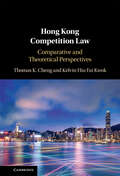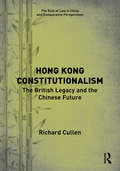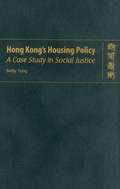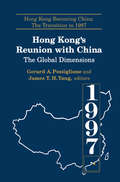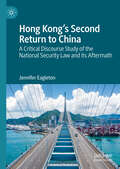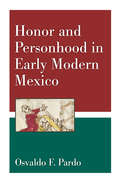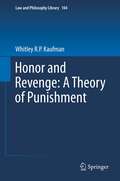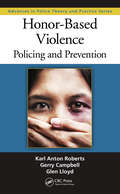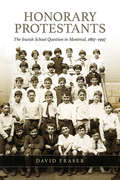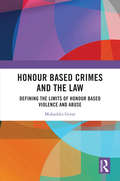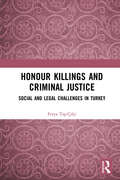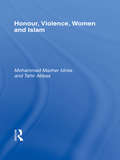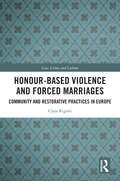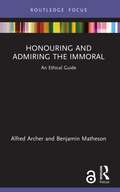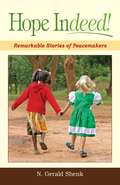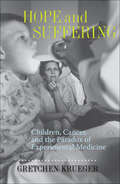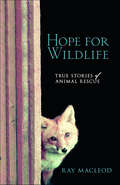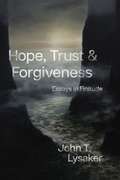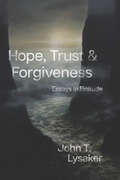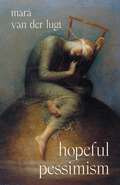- Table View
- List View
Hong Kong Competition Law: Comparative and Theoretical Perspectives
by Thomas K. Cheng Kelvin Hiu KwokThis is the first academic monograph on the new competition law in Hong Kong. It provides an overview of the historical background of the Competition Ordinance, highlighting the debate and the process that led to the adoption of the Ordinance. It offers detailed comparative and theoretical analysis of the key provisions of the Ordinance, focusing on the First Conduct Rule, the Second Conduct Rule, the exclusions and exemptions, and the procedural provisions. It draws on overseas legislation and jurisprudence that inspired the provisions in the Ordinance and incorporates a detailed examination of the latest cases decided by the Competition Tribunal. It engages in relevant academic debates and theoretical analysis of how competition law in Hong Kong should develop in light of its unique economic and political contexts. It concludes by setting forth of a set of recommendations for further reform.
Hong Kong Constitutionalism: The British Legacy and the Chinese Future (The Rule of Law in China and Comparative Perspectives)
by Richard CullenHong Kong is widely regarded as an exemplar of authoritarian jurisdictions with a positive history of adhering to Rule of Law–shaped governance systems. British Hong Kong provides a remarkable story of the effective development and consolidation of such a system, which has continued to apply since 1997, when it became the Hong Kong Special Administrative Region (HKSAR) within the People’s Republic of China (PRC). This book adopts a fresh approach in examining the evolution of Hong Kong’s political-legal experience. It establishes that these prominent governance achievements were built on particular British constitutional foundations forged over many centuries. The work shows how the analysis of the British theorist Albert Dicey and, in particular, “Diceyan Constitutionalism” was fundamental, within the pivotal context of “Chinese Familism”, in shaping the development of governance institutions and operational procedures within the new British Colony. It discusses how Hong Kong’s system of Authoritarian Legality has come to pass. Exploring the essence of that system, the study probes how thoroughly it has been stress-tested, not least in 2019, and how well it may be placed to cope with tests yet to come. It also analyzes Hong Kong–Beijing relations and the long-term prospects for the HKSAR within the PRC based on a balanced contemporary assessment of China’s exceptional One Party State.
Hong Kong's Court of Final Appeal
by Yash Ghai Simon N. M. YoungIn the years since it was established on 1 July 1997, Hong Kong's Court of Final Appeal has developed a distinctive body of new law and doctrine with the help of eminent foreign common law judges. Under the leadership of Chief Justice Andrew Li, it has also remained independent under Chinese sovereignty and become a model for other Asian final courts working to maintain the rule of law, judicial independence and professionalism in challenging political environments. In this book, leading practitioners, jurists and academics examine the Court's history, operation and jurisprudence, and provide a comparative analysis with European courts and China's other autonomous final court in Macau. It also makes use of extensive empirical data compiled from the jurisprudence to illuminate the Court's decision-making processes and identify the relative impacts of the foreign and local judges.
Hong Kong's Housing Policy - A Case Study in Social Justice
by Betty YungThis book examines housing policy in Hong Kong using a new and unique interdisciplinary approach - combining the philosophical discussion on social justice with policy and housing studies. It considers both Western and Chinese concepts of social justice,a
Hong Kong's Reunion with China: The Global Dimensions (Hong Kong Becoming China Ser.)
by Gerard A. Postiglione James Tuck-Hong TangThe issues surrounding Hong Kong's global position and international links grow increasingly complex by the day as the process of Hong Kong's transformation from a British colony to a Chinese Special Administration Region unfolds. This volume addresses a number of questions relating to this process. How international is Hong Kong? What are its global and international dimensions? How important are these dimensions to its continued success? How will these dimensions change, especially beyond the sphere of economics? Is Hong Kong's internationalization, defined in terms of its willingness to embrace international values and its capacity to maintain its international presence, at risk? These questions are presented as they pertain to the changing situation; relations between mainland China, Taiwan and Hong Kong; the positions of Australia, Canada and the United States on Hong Kong; internalization of international legal values; Americanization vs. Asianization; linkages to the world through Guangdong; strategies to emigrate overseas, cultural internationalization; media internationalization and universities within the global economy.
Hong Kong's Second Return to China: A Critical Discourse Study of the National Security Law and its Aftermath
by Jennifer EagletonThis book is a cross-disciplinary study, incorporating political science, law, and sociolinguistics in its examination of Hong Kong&’s National Security Law which has impacted many aspects of life in the city. Through a critical discourse analysis lens, it details the lead-up to the Law&’s introduction in 2020, a textual analysis of the Law itself, the &“selling&” the Law to the public, the accompanying electoral changes, the effect on civil society, and the discourse of dissidents in exile. It ends with speculation on what the future will bring to the so-called &“One Country, Two Systems&” as it goes forward. The book caters for the general reader, the university student, and seasoned academic who want to be informed about the changes in Hong Kong as it transitions to be more &“fully China&”. The book ultimately argues that the &“One Country, Two Systems&” experimental framework had always been problematic from both a rhetorical and ideological perspective.
Honor And Personhood In Early Modern Mexico
by Osvaldo F. PardoOsvaldo F. Pardo examines the early dissemination of European views on law and justice among Mexico s native peoples. Newly arrived from Spain in the sixteenth and seventeenth centuries, mendicant friars brought not only their faith in the authority of the Catholic Church but also their reverence of the monarchy. Drawing on a rich range of documents dating from this era including secular and ecclesiastical legislation, legal and religious treatises, bilingual catechisms, grammars on indigenous languages, historical accounts, and official reports and correspondence Pardo finds that honor, as well as related notions such as reputation, came to play a central role in shaping the lives and social relations of colonists and indigenous Mexicans alike. Following the application and adaptation of European ideas of justice and royal and religious power as they took hold in the New World, Pardo sheds light on the formation of colonial legalities and long-lasting views, both secular and sacred, that still inform attitudes toward authority in contemporary Mexican society. "
Honor and Revenge: A Theory of Punishment
by Whitley R.P. KaufmanThis book addresses the problem of justifying the institution of criminal punishment. It examines the "paradox of retribution": the fact that we cannot seem to reject the intuition that punishment is morally required, and yet we cannot (even after two thousand years of philosophical debate) find a morally legitimate basis for inflicting harm on wrongdoers. The book comes at a time when a new "abolitionist" movement has arisen, a movement that argues that we should give up the search for justification and accept that punishment is morally unjustifiable and should be discontinued immediately. This book, however, proposes a new approach to the retributive theory of punishment, arguing that it should be understood in its traditional formulation that has been long forgotten or dismissed: that punishment is essentially a defense of the honor of the victim. Properly understood, this can give us the possibility of a legitimate moral justification for the institution of punishment.
Honor, Politics, and the Law in Imperial Germany, 1871-1914
by Ann GoldbergHonor in nineteenth-century Germany is usually thought of as an anachronistic aristocratic tradition confined to the duelling elites. In this innovative study Ann Goldberg shows instead how it pervaded all aspects of German life and how, during an era of rapid modernization, it was adapted and incorporated into the modern state, industrial capitalism, and mass politics. In business, state administration, politics, labor relations, gender and racial matters, Germans contested questions of honor in an explosion of defamation litigation. Dr Goldberg surveys court cases, newspaper reportage, and parliamentary debates, exploring the conflicts of daily life and the intense politicization of libel jurisprudence in an era when an authoritarian state faced off against groups and individuals from 'below' claiming new citizenship rights around a democratized notion of honor and law. Her fascinating account provides a nuanced and important new understanding of the political, legal and social history of imperial Germany.
Honor, Status, and Law in Modern Latin America
by Sueann Caulfield Sarah C. Chambers Lara PutnamThis collection brings together recent scholarship that examines how understandings of honor changed in Latin America between political independence in the early nineteenth century and the rise of nationalist challenges to liberalism in the 1930s. These rich historical case studies reveal the uneven processes through which ideas of honor and status came to depend more on achievements such as education and employment and less on the birthright privileges that were the mainstays of honor during the colonial period. Whether considering court battles over lost virginity or police conflicts with prostitutes, vagrants, and the poor over public decorum, the contributors illuminate shifting ideas about public and private spheres, changing conceptions of race, the growing intervention of the state in defining and arbitrating individual reputations, and the enduring role of patriarchy in apportioning both honor and legal rights. Each essay examines honor in the context of specific historical processes, including early republican nation-building in Peru; the transformation in Mexican villages of the cargo system, by which men rose in rank through service to the community; the abolition of slavery in Rio de Janeiro; the growth of local commerce and shifts in women's status in highland Bolivia; the formation of a multiethnic society on Costa Rica's Caribbean coast; and the development of nationalist cultural responses to U. S. colonialism in Puerto Rico. By connecting liberal projects that aimed to modernize law and society with popular understandings of honor and status, this volume sheds new light on broad changes and continuities in Latin America over the course of the long nineteenth century. Contributors. Jos Amador de Jesus, Rossana Barragn, Sueann Caulfield, Sidney Chalhoub, Sarah C. Chambers, Eileen J. Findley, Brodwyn Fischer, Olvia Maria Gomes da Cunha, Laura Gotkowitz, Keila Grinberg, Peter Guardino, Cristiana Schettini Pereira, Lara Elizabeth Putnam
Honor-Based Violence: Policing and Prevention (Advances in Police Theory and Practice)
by Karl Anton Roberts Gerry Campbell Glen LloydHonor-based violence (HBV) is a crime committed to protect or defend the honor of a family and/or a community. It is usually triggered by the victim‘s behavior, which the family and/or community regards as causing offense or dishonor. HBV has existed for thousands of years but has only very recently become a focus of law enforcement, policy makers,
Honorary Protestants
by David Fraser The Osgoode SocietyWhen the Constitution Act of 1867 was enacted, section 93 guaranteed certain educational rights to Catholics and Protestants in Quebec, but not to any others. Over the course of the next century, the Jewish community in Montreal carved out an often tenuous arrangement for public schooling as "honorary Protestants," based on complex negotiations with the Protestant and Catholic school boards, the provincial government, and individual municipalities. In the face of the constitution's exclusionary language, all parties gave their compromise a legal form which was frankly unconstitutional, but unavoidable if Jewish children were to have access to public schools. Bargaining in the shadow of the law, they made their own constitution long before the formal constitutional amendment of 1997 finally put an end to the issue.In Honorary Protestants, David Fraser presents the first legal history of the Jewish school question in Montreal. Based on extensive archival research, it highlights the complex evolution of concepts of rights, citizenship, and identity, negotiated outside the strict legal boundaries of the constitution.
Honour Based Crimes and the Law: Defining the Limits of Honour Based Violence and Abuse
by Mukaddes GorarHonour based violence and abuse manifests itself in different forms, and this book offers a comprehensive understanding of this phenomenon. This book argues that the limits of honour crimes must be defined more widely so that they include conducts and behaviours that originate from the patriarchal notion of honour, such as honour based oppression and breast ironing. The book provides a critical analysis and synthesis of the law in England and Wales and in the international human rights sphere. The relevant domestic legislation and cases are examined to reflect on whether adequate protection is provided for the victims and potential victims of honour based violence and abuse. Since honour based violence is a violation of human rights, the relevant international human rights law is examined to illustrate the perception of such crimes in the international arena. The effectiveness of any remedy for victims of honour based violence and abuse depends on its capability to change deep rooted behaviours in communities with honour based patriarchal values. This book argues that the law does not provide the effective impact required, in part due to patriarchal structures, and that more efforts should be dedicated to changes in education. It is held that there is a need for an educational programme that is especially designed to tackle violence and promote gender equality. The book will be essential reading for academics, researchers and policy-makers working in the areas of Human Rights Law, Criminal Law and Gender Studies.
Honour Killings and Criminal Justice: Social and Legal Challenges in Turkey
by Ferya Taş-ÇifçiDespite recent reforms to the Turkish Penal Code, the country retains a high level of honour-based violence. This book analyses the motives behind honour-based violence in Turkey and examines the criminal justice system’s approach to this type of crime. The work takes a socio-legal approach to explore the concepts of honour, patriarchy, and hierarchy, along with the roles of culture and tradition. It also examines how the legal system deals with this phenomenon, focusing on the decisions of the criminal courts in honour killing cases and drawing on prisoner interviews. These analyses show the extent to which the State follows a patriarchal approach when dealing with honour killings and inform recommendations for improving the legal and criminal justice system so as to deter crimes of this nature.
Honour, Violence, Women and Islam
by Mohammad Mazher IdrissWhy are honour killings and honour-related violence (HRV) so important to understand? What do such crimes represent? And how does HRV fit in with Western views and perceptions of Islam? This distinctively comparative collection examines the concept of HRV against women in general and Muslim women in particular. The issue of HRV has become a sensitive subject in many South Asian and Middle Eastern countries and it has received the growing attention of the media, human rights groups and academics around the globe. However, the issue has yet to receive detailed academic study in the United Kingdom, particularly in terms of both legal and sociological research. This collection sets out the theoretical and ethical parameters of the study of HRV in order to address this intellectual vacuum in a socio-legal context. The key objectives of this book are: to construct, and to develop further, a theory of HRV; to rationalise and characterise the different forms of HRV; to investigate the role of religion, race and class in society within this context, in particular, the role of Islam; to scrutinise the role of the civil/criminal law/justice systems in preventing these crimes; and to inform public policy-makers of the potential policies that may be employed in combating HRV.
Honour-Based Violence and Forced Marriages: Community and Restorative Practices in Europe (Law, Crime and Culture)
by Clara RigoniIn the last 20 years, the related phenomena of honour-based violence and forced marriages have received increasing attention at the international and European level. Punitive responses towards this type of violence have been adopted, including ad hoc criminalisation and legislation containing direct references to the concepts of honour, culture, and tradition. However, criminal law-based responses present several shortcomings and have often disregarded the specific needs that victims of such crimes might encounter. This book examines the possibility of using alternative programmes to address cases of honour-based violence and forced marriages. After reviewing previous existing literature, it presents new empirical data. Introducing a case study from the United Kingdom, the book recalls the debate on Sharia Councils and the Muslim Arbitration Tribunal, but examines instead other community-based secular programmes. By comparison, a study from Norway on the work of the National Mediation Agency and the so-called Cross-Cultural Transformative Mediation model is investigated as part of a larger multi-agency approach. Ultimately, in an attempt to reconcile pluralism and the rule of law, the book proposes effective ways to tackle honour crimes based on cooperation and individualisation of the proceedings, and capable of improving women’s access to justice and reducing secondary victimisation. The book will be essential reading for researchers and academics in Law, Criminology, Sociology, and Anthropology and for policy-makers and practitioners working with honour-based violence cases.
Honouring Social Justice
by Margaret E. BeareHonouring Social Justice brings together a diverse group of leading legal scholars, criminologists, and sociologists to study numerous contemporary social justice issues. In doing so, the contributors to this collection present a thorough and multifaceted portrait of recent successes and challenges of the criminal justice systems in Canada and elsewhere.Examining a broad range of vital contemporary social, judicial, and political issues, the essays in this volume pursue topics such as the targeting of marginalized groups, wrongful convictions, gender-based bias in law, government accountability, and inequalities in the application of the law to ethnic and socio-economic groups. These essays provide an illuminating introduction to the background of important social causes, and describe dedicated examples of how to effectively champion calls for social justice.Written to honour the life and work of the late Dianne Martin, a renowned scholar, lawyer, and social activist, Honouring Social Justice is an engaging and inspired series of accounts on how to improve society by leading experts from across the country.
Honouring and Admiring the Immoral: An Ethical Guide (Routledge Focus on Philosophy)
by Benjamin Matheson Alfred ArcherIs it appropriate to honour and admire people who have created great works of art, made important intellectual contributions, performed great sporting feats or shaped the history of a nation if those people have also acted immorally? This book provides a philosophical investigation of this important and timely question. The authors draw on the latest research from ethics, value theory, philosophy of emotion, social philosophy and social psychology to develop and substantiate arguments that have been made in the public debates about this issue. They offer a detailed analysis of the nature and ethics of honour and admiration, and present reasons both in favor and against honouring and admiring the immoral. They also take on the important matter of whether we can separate the achievements of public figures from their immoral behavior. Ultimately, the authors reject a "one-size-fits-all" approach and argue that we must weigh up the reasons for and against honouring and admiring in each particular case. Honouring and Admiring the Immoral is written in an accessible style that shows how philosophy can engage with public debates about important ethical issues. It will be of interest to scholars and students working in moral philosophy, philosophy of emotion, and social philosophy.
Hoover's Fbi: The Inside Story By Hoover's Trusted Lieutenant (Cold War Classics Ser.)
by Cartha D. DeLoachThe FBI is the world's most famous law enforcement agency and also one of the world's most mysterious organizations. Only the few who were part of J. Edgar Hoover's inner circle know the truths of five decades of his authoritarian rule. In this gripping personal account, Deke DeLoach, who was privy to Hoover's thoughts and actions during the FBI's most tumultuous years, tells his insider story.
Hope Indeed: Remarkable Stories Of Peacemakers
by N. ShenkGerald Shenk has traveled to and lived in many difficult places. He goes to teach-and to spot people who act out of hope. When he began to feel fortified by what he discovered, even foolishly rich, he wrote what he had witnessed and heard for the rest of us. Hope Indeed! is his collection of stories of stunningly ordinary people behaving with extraordinary hope. Here are the stories of- Ned Wyse, a farmer/pastor in Michigan, chosen randomly for a violent beating by some neighborhood kids, and what he did about it. The Palestinian parents who gave their young murdered son's organs to ill Jewish children. The Amish, who subverted the vicious violation of their innocent children in the Nickel Mines school by refusing to multiply the horror, and instead offered forgiveness and generosity. Jewish Cantor Michael Weisser and his family who took carry-out food to the white supremacists who had harassed them mercilessly. The German Lutheran pastor couple who offered their home to recently desposed and homeless Erich Honecker, who had ruthlessly ruled East Germany. Brother Ivo who kept bringing former Catholic and Muslim neighbors together as war escalated in Bosnia. Says Shenk, "Here are stories to rehearse if we want to become people who subvert vengeance with kindness."
Hope and Suffering: Children, Cancer, and the Paradox of Experimental Medicine
by Gretchen KruegerGretchen Krueger's poignant narrative explores how doctors, families, and the public interpreted the experience of childhood cancer from the 1930s through the 1970s. Pairing the transformation of childhood cancer from killer to curable disease with the personal experiences of young patients and their families, Krueger illuminates the twin realities of hope and suffering. In this social history, each decade follows a family whose experience touches on key themes: possible causes, means and timing of detection, the search for curative treatment, the merit of alternative treatments, the decisions to pursue or halt therapy, the side effects of treatment, death and dying—and cure. Recounting the complex and sometimes contentious interactions among the families of children with cancer, medical researchers, physicians, advocacy organizations, the media, and policy makers, Krueger reveals that personal odyssey and clinical challenge are the simultaneous realities of childhood cancer. This engaging study will be of interest to historians, medical practitioners and researchers, and people whose lives have been altered by cancer.
Hope for Wildlife: True Stories of Animal Resuce
by Ray MacLeodOne day, a couple who had run over a skunk with their car brought it to the Dartmouth Veterinary Hospital. When the veterinarians couldn't look after it, Hope Swinimer decided to take the helpless animal into her care, and that was the start of it all. Now, through her rehabilitation centre called Hope for Wildlife, Hope's name is synonymous with wildlife rescue in Nova Scotia.Since 1997, hundreds of animals have been saved through the tireless efforts of the staff and volunteers at Hope for Wildlife. Some animals' stories were so unique that they even garnered national attention-such as Hope's battle with the department of natural resources over Gretel, a member of the endangered pine marten species. Each creature comes with its own challenges, either through a particularly difficult injury or a quirky personality-like Lucifer the inexplicably bald and ornery raccoon-but each patient leaves an indelible mark on the lives of those around them.Hope for Wildlife tells the stories of fourteen different wild animals from Nova Scotia that have passed through the centre. Colour photographs of the animals and the centre's efforts supplement the text, and info boxes offer further information on the province's wildlife. The stories in Hope for Wildlife are educational, heartwarming, and sometimes heartbreaking-but always filled with hope.
Hope, Trust, and Forgiveness: Essays in Finitude
by John T. LysakerA new ethics of human finitude developed through three experimental essays. As ethical beings, we strive for lives that are meaningful and praiseworthy. But we are finite. We do not know, so we hope. We need, so we trust. We err, so we forgive. In this book, philosopher John T. Lysaker draws our attention to the ways in which these three capacities—hope, trust, and forgiveness—contend with human limits. Each experience is vital to human flourishing, yet each also poses significant personal and institutional challenges as well as opportunities for growth. Hope, Trust, and Forgiveness explores these challenges and opportunities and proposes ways to best meet them. In so doing, Lysaker experiments with the essay as a form and advances an improvisational perfectionism to deepen and expand our ethical horizons.
Hope, Trust, and Forgiveness: Essays in Finitude
by John T. LysakerA new ethics of human finitude developed through three experimental essays. As ethical beings, we strive for lives that are meaningful and praiseworthy. But we are finite. We do not know, so we hope. We need, so we trust. We err, so we forgive. In this book, philosopher John T. Lysaker draws our attention to the ways in which these three capacities—hope, trust, and forgiveness—contend with human limits. Each experience is vital to human flourishing, yet each also poses significant personal and institutional challenges as well as opportunities for growth. Hope, Trust, and Forgiveness explores these challenges and opportunities and proposes ways to best meet them. In so doing, Lysaker experiments with the essay as a form and advances an improvisational perfectionism to deepen and expand our ethical horizons.
Hopeful Pessimism
by Mara van der LugtWhy &“hopeful pessimism&” is not a contradiction in terms but a powerful source of moral and political commitmentThe climate debate is rife with calls for optimism. While temperatures rise and disasters intensify, we are asked to maintain optimism and hope, as if the real threat is pessimism and despair. In this erudite and engaging book, Mara van der Lugt argues that this is a mistake: crude optimism can no longer be a virtue in a breaking world, and may well prove to be our besetting vice. In an age of climate change and ecological devastation, the virtue we need is hopeful pessimism.Drawing on thinkers that range from J.R.R.Tolkien and Mary Shelley to Albert Camus and Jonathan Lear, van der Lugt invites us to rethink what we thought we knew about optimism and pessimism, hope and despair, activism and grief. She shows that pessimism is closely linked to a tradition of moral and political activism, and offers a different way to think about pessimism: not as synonymous with despair but as compatible with hope. Gently yet fiercely, van der Lugt argues that what we need to avoid is not pessimism but fatalism or self-serving resignation. Pessimism does not imply the loss of courage or the lack of a desire to strive for a better world; on the contrary, these are the very gifts that pessimism can bestow.What Hopeful Pessimism asks instead is that we strive for change without certainties, without expecting anything from our efforts other than the knowledge that we have done what we are called upon to do as moral agents in a time of change.
